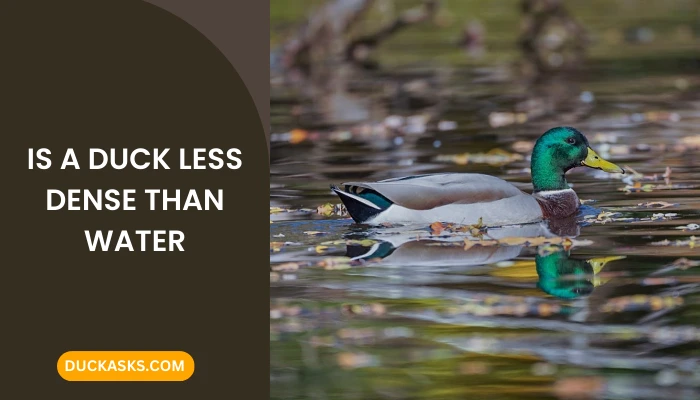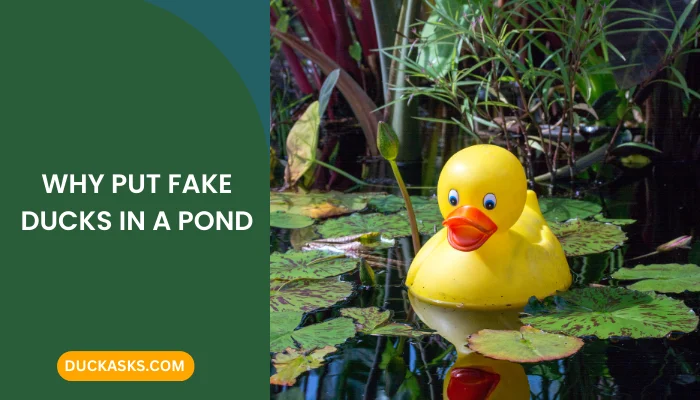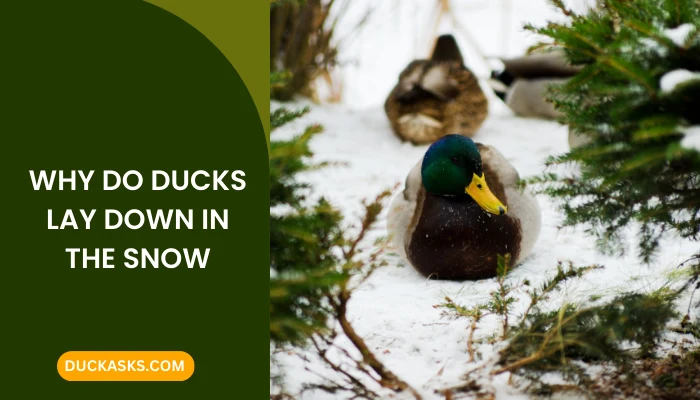Why Do Ducks Quack and Geese Honk?
While they may have some similarities physically, ducks and geese have different calling sounds. Ducks call out by quacking while geese honks to communicate.
But why do ducks quack and geese honk? The physical structure around the vocal cords differs from one another, which plays a crucial role in why ducks quack and geese honk.
But there is more to it than meets the eye when it comes to the quacking and honking of ducks and geese. Continue reading this guide and find out the key differences of these sounds.
What Makes Ducks Quack and Geese Honk?
The key differences that make ducks quack and geese honk are –
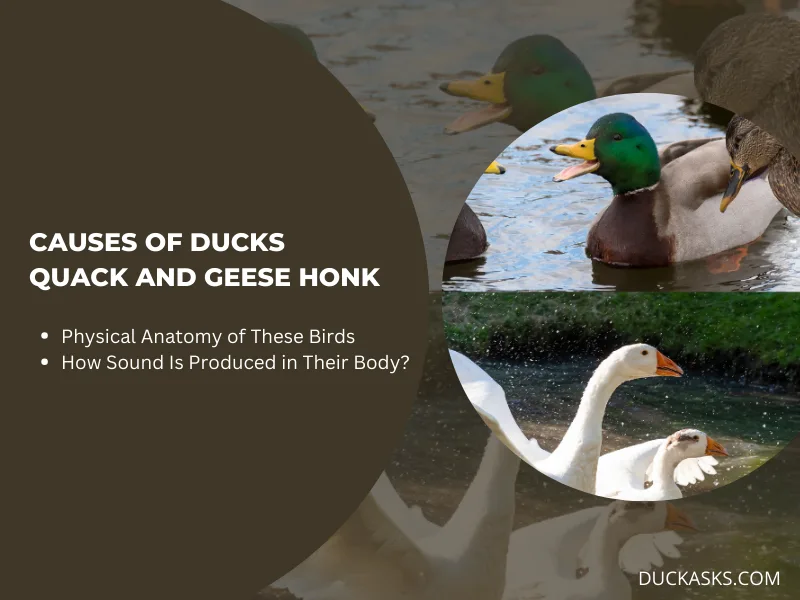
Physical Anatomy of These Birds
If you compare a duck and a goose physically, you will notice that ducks have short and stout necks compared to a goose.
This neck structure allows ducks to have a much more developed larynx than a goose, which allows the ducks to make much more complicated vocalizations like quacking.
Compared to that a goose has a much longer and more muscular neck. This length actually restricts their vocalization capability. Therefore, restricting them to a much simpler honking sound instead of quacking or whistling.
How Sound Is Produced in Their Body?
Ducks create their quacking sound when air is expelled through the larynx. The larynx starts to vibrate when air enters and that results in the quacking sound.
For quacking, the larynx plays the most important role. Depending on the size of the larynx, there can be variations in the quacking sound.
That is not the case for geese, though. They make their honking sound with the help of their windpipe or the elongated trachea. The trachea’s length plays a role in the vocal range but doesn’t make enough distinction to the overall sound.
Quacking and Honking – Are Ducks and Geese Trying to Communicate?
The primary reason why ducks quack and geese honks are to communicate among their species. These calls are used to convey various messages among their peers.

For ducks, quacking allows them to socially interact with others. As ducks often move in flocks, this way of communication becomes almost necessary. Quacking allows them to forage, swim, and search for food together in a group.
The same goes for geese as well. Honking is the preferred method of communication among a flock of geese as this allows them to stay connected with each other, maintain flight, and navigate without facing any issues.
Ducks and geese both use their calls during mating season. They also use these calls as warning signals or when they have become aggressive.
The Differences in Quacking and Honking
While you may think there isn’t much difference between quacking and honking apart from how they sound, there are a few notable changes.
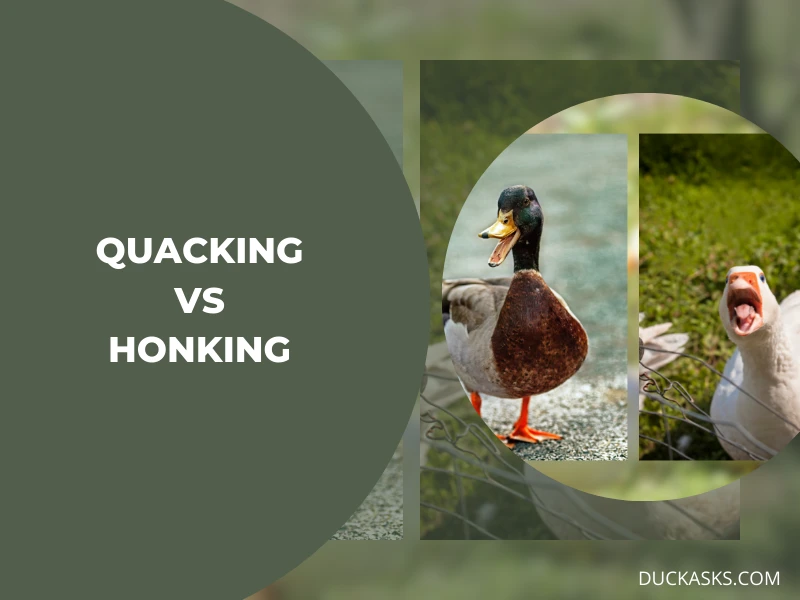
Sound Variation
One of the key differences between quacking and honking is the variety. Quacking offers more variety and is a complex vocalization when compared with honking.
Their quacks can be high-pitched, low, raspy, or soft. This way, through their quacks, ducks can display a multitude of emotions. On the other hand, honking is a simpler callout that isn’t a complex vocalization.
They are single notes, don’t offer that many varieties and are usually used for communication among the flock.
Sound Production
As mentioned earlier, a quacking sound is made from the trachea. When airflows in the larynx vibrate, it releases the quacking sound.
The size of the larynx can influence the tone, and the airflow pressure the ducks create can also affect the sound.
For geese, the honking sound is made from their elongated trachea. Due to their long necks, the airflow and vibration are limited. The size of the trachea among geese doesn’t change based on their species, meaning the sound is almost the same.
Due to using different body parts, quacking and honking are different sounds. This is also why some species of ducks make a different type of quacking sound while most of the honking sound from different species of geese feels the same.
Loudness Level
The honking sound of geese is louder than the quacking sound of ducks. This is ideal for geese when they are flying, and navigation is necessary.
Sound Usage
Ducks use the quacking sounds to display a range of emotions. When they are threatened or have become aggressive, then the quack louder. During their mating period, they might make a humming-type quacking sound.
On the other hand, geese usually opt for honking whenever they try to communicate with their flock members or when trying to attract their partner during the mating period.
Conclusion
At first glance, we all might make the mistake that ducks and geese make the same calling sounds.
But that isn’t true at all because ducks’ quack and geese honk when they are planning to communicate with others or trying to express some sort of emotion.
So, if you ever wondered why ducks quack and geese honk, then know that it’s for communicating purposes, just like we humans express our feelings through talking with one another.
If you like this guide on ducks & geese, then make sure to follow us on Facebook, Pinterest and Twitter. We provide similar types of interesting content and would love to hear your opinions and requests!
References:
- https://lafeber.com/vet/waterfowl-anatomy-physiology-a-dozen-key-facts/
- https://www.researchgate.net/publication/289746866_The_Gross_Anatomy_of_Larynx_Trachae_and_Syrinx_in_Goose_Anser_anser_domesticus
- https://www.irishexaminer.com/opinion/columnists/arid-20010688.html
- https://www.pressconnects.com/story/news/local/2019/03/04/ask-scientist-ducks-quack-several-different-reasons/3009779002/


